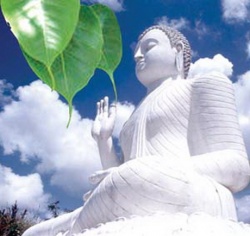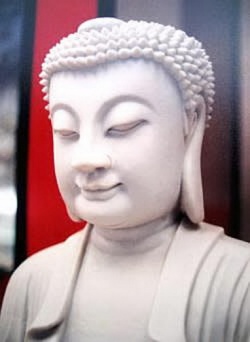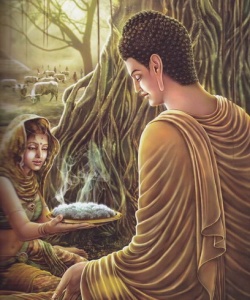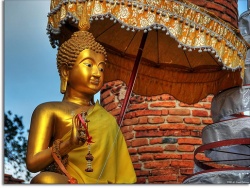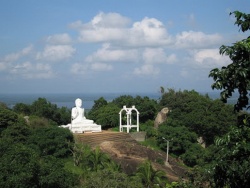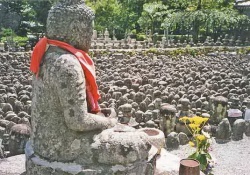On Alaya Mind & the Wind of Impermanence
People are travelers. We travel from yesterday to today. Today to tomorrow. We do this year after year. Japanese poet Ikkyu said that New Year's Day even though on the surface is a cause for celebration is actually just a milestone toward the afterlife. The idea of man as a traveler has been used in songs, poems, and stories for centuries.
Our trip can be sunny, rainy or windy. It can be mountainous or deep into a valley. Or it can be as simple as a walk on a flatland, because so many things can happen on the journey. We have many encounters with various characters throughout our voyage. Misfortune comes our way. Some days are just normal. We say goodbye here and there to many good people we've met. The weather is fine on some days and bad on others.
The nature of our soul's journey is limitless. It flows in a continual stream from the beginningless past, forward into the eternal future. The journey of this body may be short, 100 years at best. And during this time, not a single person can understand us to the core.
Sakyamuni Buddha said, "Alone we are born, and alone we die. Alone we come, and alone we depart." Our physical bodies may have company, but our souls are all alone. We have lived our eternal life in complete solitude, and not even family can understand us at the deepest level.
For example, husbands and wives are separate individuals, even though they are married and may act together as a family. This world may seem like a universal place where we are all sharing a common reality. However, each person is experiencing something different from their own point of view.
We all have an Alaya Mind (Storehouse Consciousness), and this is also known as our True Self. It represents our eternal life. The Alaya Mind forms its own world from the various deeds of our distant past that are contained within it. The deeds we perform now in the present are stored into our Alaya Mind which then shapes our future.
So in short, we're all living right now in the world of our Alaya Mind. Putting this into perspective, that means hundreds and thousands, even millions or billions of worlds are existing together in separate Alaya Minds around us. Each one lives in its own unique reality.
A wife just can't see what life looks like through her husband's eyes, no matter how hard she tries. To understand him completely is simply out of the question. The husband can't even get a real glimpse despite his strongest efforts. A husband and wife can only know their own Alaya Mind. It's not possible to understand another person's world as they see it. It is an exclusive experience to the individual, and that is why it is said that we are born alone and die alone.
It's also why whether we know it or not, there is a deep, restless loneliness within us. Our soul is yearning for true company. We devise numerous diversions -- joking, singing or dancing -- yet it doesn't wipe away our loneliness. Not for long at least. There still remains a recurring empty solitude, because no one gets us or understands our world completely.
Children hold secrets from their parents, and parents don't tell everything to their kids. Husbands and wives keep quiet on a lot of issues. That is the nature of our true mind. It is one of complete solitude and hidden darkness. There is no soul that can bare it all, all the time.
In bustling metropolises like Los Angeles, Tokyo, New Delhi, Berlin, London, or Moscow, we are constantly surrounded by people. How is it that though we are surrounded by millions, we can still feel so alone and desperately lost in the crowd? We just have no true companionship for our soul.
This doesn't mean we don't need to understand others or shouldn't bother to get very close to people. We must of course try to get to know people and care about them. But it is an oversized ego that believes it can truly get another person completely. It denotes someone who is 100% in the dark about their own self.
Our Alaya Mind is hurting. There is no way we can figure out how to solve this situation. We long to bare all of our soul and need to be able to understand it. Only by knowing who we really are can we obtain absolute happiness. Listening to Pure Land Buddhism, we come closer to arriving at this life-changing moment. We come to learn our True Self fully, realize the roles of the countless buddhas, as well as fully grasp the role of Amida Buddha and the Pure Land. By listening steadily and knowing these concepts -- not just believing in them blindly -- we can finally celebrate in not being alone for the first time in our eternal life.
Until we find the truth, life seems to have a mysterious sadness to it. People will dwell on all sorts of thoughts to distract themselves from it -- yet it returns, again and again. We rely on systems of politics, ethics, morals, laws in an attempt to restore balance to this desperate world.
Every month we have holidays with fireworks and festivals filled with people who want to escape for a while. They want to forget their solitude in the fun, but they can't seem to leave that emptiness behind when it's time to pick up trash after the party. Fireworks don't last, but it's also what makes them wonderful to look at. At best, could they go on for an hour straight, a whole day, or a full month like that? Would it even remain as exciting at that point? The thrill comes from the rareness of the experience.
The various fireworks of our lives flicker quickly, in and out, here and there throughout the years, and a lifetime of even 100 years can disappear quietly into the smoky dark without notice. In the end, the greater the fireworks display, the greater the sorrow.
Life is the same way. Once it's over, we're left to the hell of our own bitter solitude at death, and the fact that our soul has no accompaniment. Right now, we're billions of lonesome travelers waiting for death while fighting for survival. We hang in this critical balance day to day.
Our fate can change drastically just by the choices and actions we make in a single moment. Life-or-death events happen to us and our loved ones all the time, but soon even they just fade away becoming the farthest thing from our mind. We move on to the next challenge. "That's life," we say. But how long can we keep that up for?
"When at last I came to the peak that I had thought would surely be the last,
I turned my eyes to the way beyond -- mountain piled on mountain."
--Anonymous
The Wind of Impermanence is always blowing along our journey whether we feel it beating down on our backs or not. Nothing lasts; everything changes. The Wind of Impermanence can be compared to a ghastly tiger stalking its unsuspecting prey.
There is a tiger behind you right now, even as you read this blog. If there is a room with 100 people, there are 100 tigers lurking behind those people. This tiger waits and waits and waits. It creeps up on all of us with the utmost stealth and suddenly attacks when we least expect it. One day -- BAM! -- it has you in its jaws, clenched in its teeth. It's a huge, hungry, and vicious tiger, and it doesn't wait for you, anyone, or anything. You could be washing your face or right in the middle of a sentence.
A professor of religion at the University of Tokyo, Hideo Kishimoto, battled with a very serious case of cancer. Kishimoto likened the idea of death to "sudden, unprovoked violence" and left a detailed account of his personal struggle with the disease:
"Death always comes suddenly.
No matter when it appears, the one visited by Death
looks on its arrival as a sudden intrusion.
For the mind filled with a sense of security
is totally unprepared for death. ...
Death comes when by rights it has no business coming.
It goes coolly where by rights it has no business going,
like a desperado striding with dirty boots into a freshly-cleaned parlor.
Death's behavior is outrageous. You may ask it to wait a while, but in vain.
Death is a monster beyond human power to budge or to hold in check."
The fearsome tiger has no compassion hunts all of us down without a shred of mercy. Its terrifying size and insatiable hunger calmly waits for the perfect opportunity to strike us. When the tiger comes closer, we may try to escape by going to the doctor and taking various medicines in order to prolong our life. But the moment will come when the tiger appears for his final lethal bite. Once we're bitten, our time here as a traveler will be over.
All of us must face the Wind of Impermanence.
This is why we must seek the truth for who we really are and obtain absolute happiness in the here and now. Without sensing that our life is fleeting, we do not feel inclined to move into action. We must seek to know what the afterlife holds in store for us as soon as possible, before it is too late. Listening to Buddhism brings us toward the real solution to these problems. Let us listen to the teachings with sincerity and reflect deeply on the crucial matter of our afterlife.
